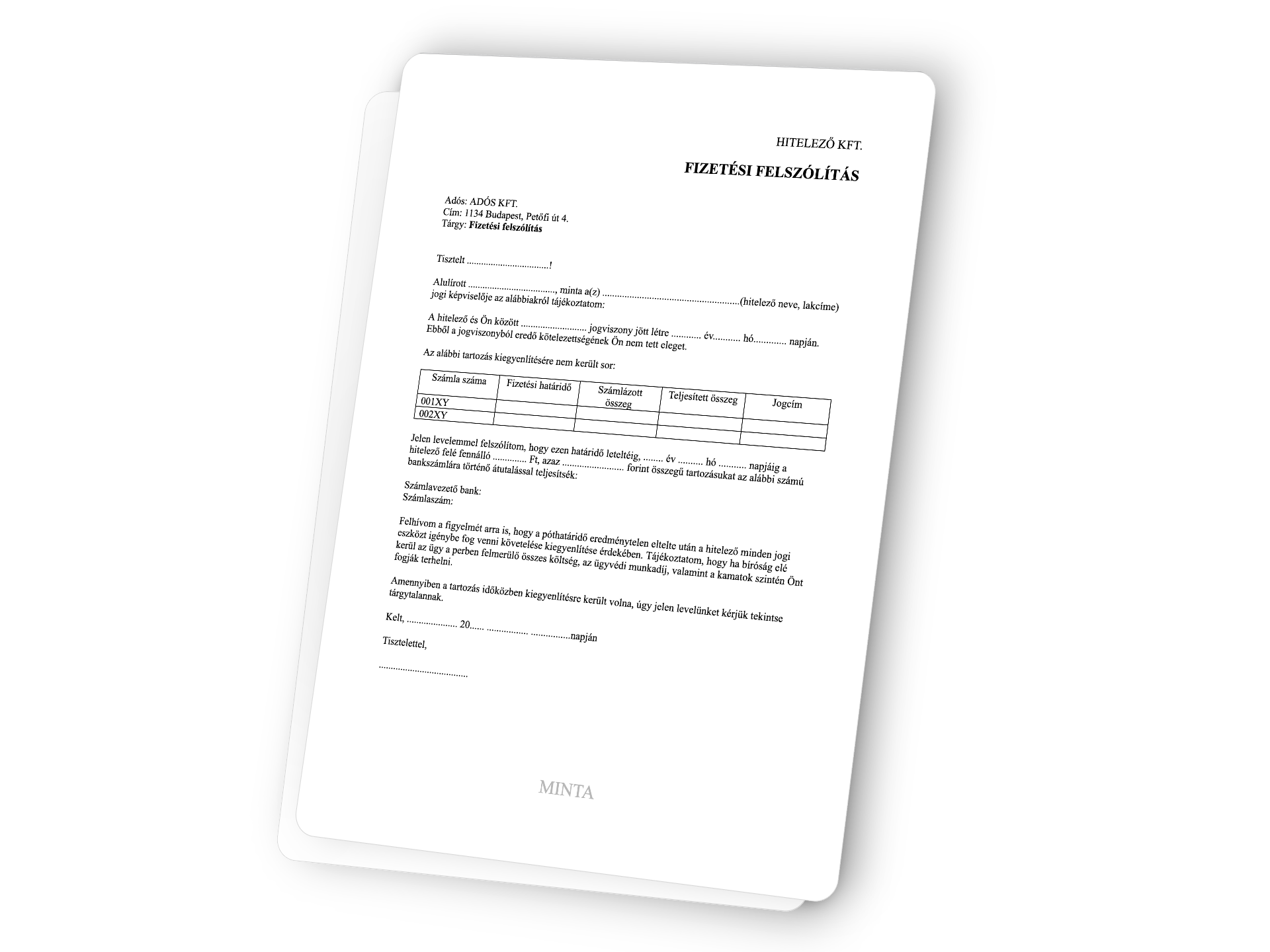A követeléskezelés egy olyan folyamat, amely magában foglalja a lejárt tartozások azonosítását, a tartozókkal való kapcsolatfelvételt, valamint a tartozások kezelését. A cél a kintlévőségek minimalizálása és a cash flow optimalizálása. A megfelelő követeléskezelési stratégia nem csak a követeléskezelés hatékonyságát javíthatja, hanem a vállalati ügyfélkapcsolatokra is pozitív hatással lehet.
Általánosságban elmondható, hogy nincs szigorú folyamata a követelések kezelésének, van olyan cég, aki csak digitális felszólítással él, de erősebb lépéseket nem tesz, és van, aki egy bizonyos lejárat után egyből fizetési meghagyást indít, nem küld előtte ügyvédi felszólítást sem. Egyszóval ahány ház, annyi szokás.
Minden cégnek és vezetőnek magának kell eldöntenie, hogy milyen lépéseket tesz, ha lejárt egy kintlévőség, és nem fizetett a vevő. Ha ennek a stratégiának a megtervezésében segítsége lenne szükséged, foglalj időpontot követeléskezelési szakértőinkhez.
A követeléskezelési megoldás kiválasztásánál figyelembe kell venni a tartozás nagyságát, a tartozó fizetési hajlandóságát és a követelés behajthatóságát. Alapvetően az alábbi lépéseket érdemes követni:
A digitális korban a vállalkozások egyre inkább fordulnak az elektronikus követeléskezelés felé. A digitális felszólítás gyors, költséghatékony, és lehetővé teszi a nagy mennyiségű adat kezelését, elemzését. Automatizált rendszerek segítségével könnyen nyomon követhetők a fizetési felszólítások és válaszok, valamint statisztikák generálhatók a követeléskezelési folyamat hatékonyságáról. Ezek közé tartozik főépp az email, SMS felszólítások, de néhol még call-centerrel is kiegészül ez a lépés.
Amikor a digitális felszólítás nem hoz eredményt, az ügyvédi felszólítás lép a képbe. Egy ügyvéd által küldött felszólítás komolyabb jogi súllyal bír, és jelzésértékű lehet a tartozó számára, hogy a vállalkozás komolyan veszi a követelés kezelését. Az ügyvédi felszólítás alkalmazása különösen akkor ajánlott, ha a tartozás összege jelentős, vagy ha a tartozó fél makacsul elzárkózik a fizetéstől.
A fizetési meghagyás egy bírósági eljárás, amely során a bíróság felszólítja a tartozó felet a tartozás rendezésére. Ez a megoldás kifejezetten jogi eszköz, amelyet akkor érdemes alkalmazni, ha a felszólításokra nem érkezik válasz vagy a tartozó nem hajlandó fizetni. A fizetési meghagyás kiadása gyorsíthatja a követelés beszedését, és a bírósági határozat értelmében akár végrehajtást is kezdeményezhet a hitelező. Fontos tudni, hogy a fizetési meghagyásból indítható majd jogerőre emelkedéskor a végrehajtás is, ami azt jelenti, hogy a végrehajtó dolgozik a pénzedért jogszerű eszközökkel (inkasszó, munkabér letiltás, árverés).
A megfelelő követeléskezelési módszer kiválasztása során mérlegelned kell a saját erőforrásaidat, a követelés nagyságát és a behajtás sürgősségét. Íme, a főbb opcióid:
Ez a legkevésbé költséges opció, ám jelentős informatikai és jogi tudást igényel. Amennyiben nem rendelkezel ezekkel, a folyamat lehet hosszadalmas és kockázatos.
Ügyvédi iroda választása jogi súlyt biztosít, de a folyamat gyakran lassú és nehézkes, ügyindítása komplikált, és az ügyek nyomon követése is nehézségekbe ütközhet.
A hagyományos követeléskezelők tapasztalattal rendelkeznek, de gyakran drágák, és a folyamatok nyomon követése nem mindig transzparens.
A digitális követeléskezelés modern, gyors és átlátható alternatívát kínál, amely jelentős mértékben leegyszerűsítheti a követeléskezelési folyamatokat. A bemutató foglalása lehetőséget biztosít a rendszer teljes körű megismerésére.
Már több ezer vállalkozás használja a digitális követeléskezelést, és a Számlázz.hu is beépítette szolgáltatásába
Magyarországon a közjegyzői kamarán (MOKK) keresztül indítható el a jogi lépés, a fizetési megahagyásos eljárás, ami egy nemperes követeléskezelési eszköz, alapvetően a kisösszegű ügyek kezelésére találta ki az EU. A fizetési meghagyás jogerőre emelkedésekor a végrehajtókhoz kerül át az ügy, akiknek további eszközeik vannak a követelés jogszerű beszedésére.
A 2023-as évben Magyarországon a vállalkozások számára elengedhetetlenül fontos, hogy hatékony, naprakész követeléskezelési stratégiákat alkalmazzanak. A digitális felszólítás, az ügyvédi felszólítás és a fizetési meghagyás mind erőteljes eszközök a vállalatok pénzügyi stabilitásának megőrzéséhez. A digitális követeléskezelés kiemelkedik hatékonyságával és egyszerűségével, így érdemes lehet a demóra jelentkezni, hogy hatékony, személyre szabott megoldást találj vállalkozásod számára.


.svg%20(1).png)
Ha szüksége volna egy dokumentumra, amit manuálisan kitölthet és kiküldhet nemfizető adósának, jó helyen jár